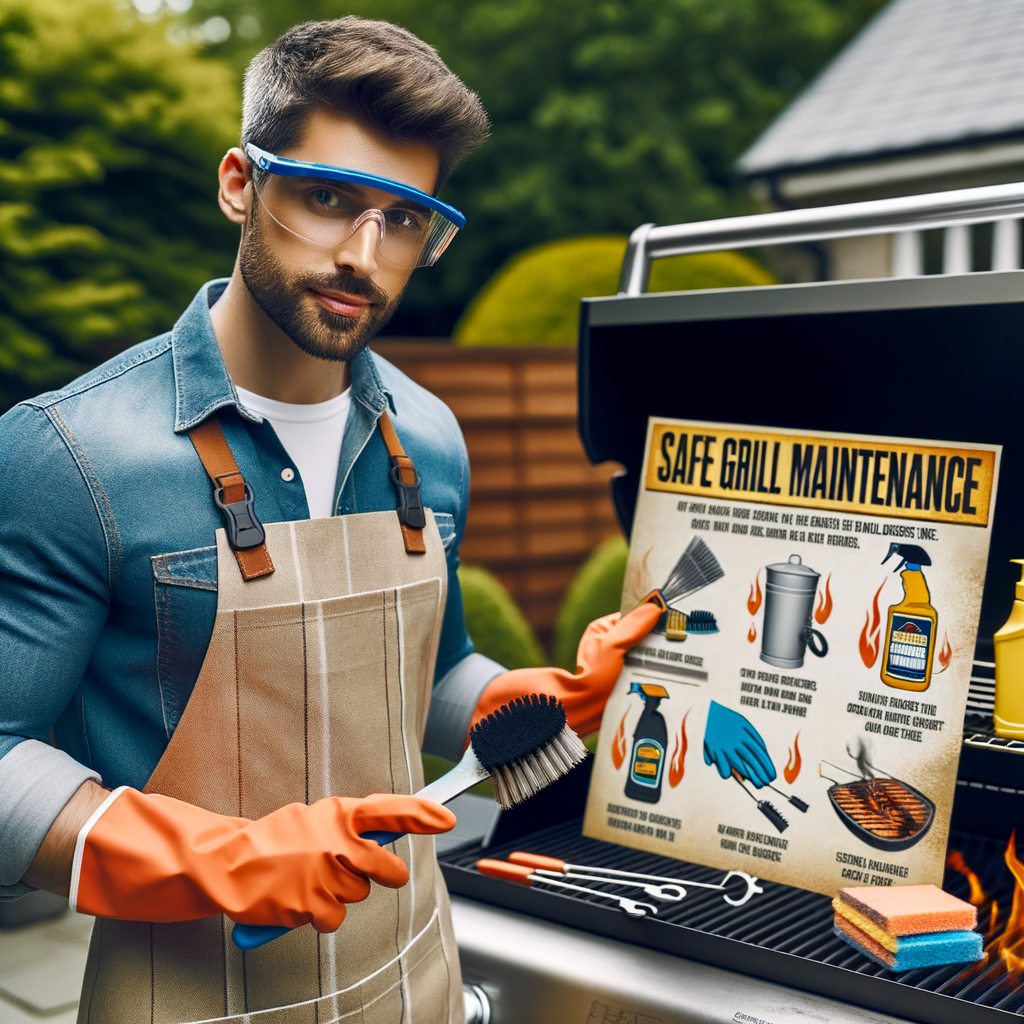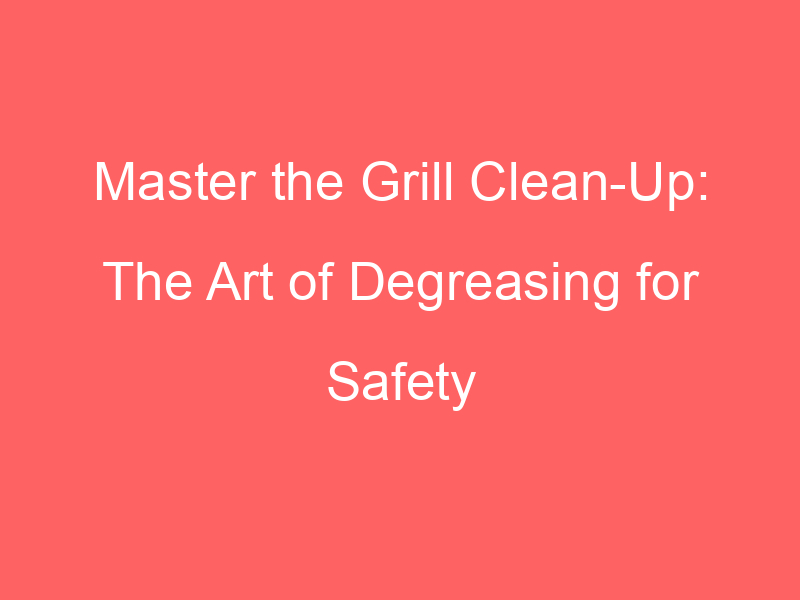
Introduction to Grill Cleaning Techniques
Grilling is a popular cooking method that many people enjoy. However, maintaining a clean grill is crucial for both the taste of your food and your health. In this section, we will discuss the importance of regular grill cleaning and provide an overview of common grill cleaning methods.
- Importance of Regular Grill Cleaning
- Flavor: Leftover food particles and grease can build up on your grill grates over time, affecting the taste of your food. Regular cleaning ensures that your food maintains its pure, smoky flavor.
- Safety: Built-up grease can ignite and cause a fire. Regular cleaning reduces this risk.
- Health: Burnt food particles can produce harmful carcinogens that can transfer to your food. Regular cleaning helps to minimize this risk.
- Longevity: Regular cleaning can extend the life of your grill by preventing rust and corrosion.
- Overview of Common Grill Cleaning Methods
- Wire Brush: This is the most common method. After heating the grill, use a long-handled wire brush to scrub off food particles and grease.
- Soapy Water: This method involves removing the grates and soaking them in warm, soapy water. After soaking, scrub the grates with a brush or sponge, rinse, and let dry.
- Vinegar Solution: A solution of equal parts vinegar and water can be used to clean the grates. Spray the solution on the grates, let it sit for a few minutes, then scrub with a brush.
- Baking Soda Paste: A paste made from baking soda and water can be used to clean the grates. Apply the paste, let it sit for 15-20 minutes, then scrub with a brush.
Cleaning your grill regularly is not just about keeping it looking good. It’s about ensuring that your food tastes its best and that you’re cooking in a safe environment. Here are a few reasons why regular grill cleaning is essential:
There are several methods you can use to clean your grill, each with its own set of benefits. Here are a few common techniques:
Remember, regular grill cleaning is a crucial part of grill maintenance. Not only does it ensure your food tastes great, but it also keeps you safe and extends the life of your grill. So, next time you fire up your grill, make sure it’s clean and ready to go!
Safe Grill Maintenance: A Comprehensive Guide
Keeping your grill clean and well-maintained is essential for its longevity and for ensuring the best tasting food. Let’s delve into a step-by-step process for BBQ grill cleaning.
BBQ Grill Cleaning: Step-by-Step Process
- Preparation for Cleaning
- Initial Scrubbing and Scraping
- Degreasing the Grill
- Final Cleaning and Drying
Before you start the cleaning process, ensure your grill is cool. Remove the grates and other removable parts. Use a grill brush to remove loose debris from these parts and the grill’s interior.
Using a grill brush, scrub the grates thoroughly to remove stuck-on food particles and grease. For stubborn spots, a grill scraper can be used. Remember, the goal is to remove as much debris as possible before the degreasing process.
Apply a grill degreaser or a solution of warm water and dish soap to the grates and the interior of the grill. Let it sit for a few minutes to break down the grease, then scrub again with the grill brush. Rinse thoroughly.
Once you’ve scrubbed and rinsed everything, it’s time for the final cleaning. Wipe down the grill and its parts with a damp cloth to remove any remaining soap or degreaser. Dry everything thoroughly to prevent rusting. Once dry, reassemble your grill.
Regular maintenance of your grill not only extends its lifespan but also improves the quality of your barbecued food. Remember, a clean grill is a happy grill!
Outdoor Grill Cleaning Tips
Keeping your outdoor grill clean is not only essential for the longevity of your grill, but also for the quality of the food you cook. Here are some tips to help you maintain your grill effectively:
- Choosing the Right Time for Cleaning
- Using the Right Tools
- Proper Disposal of Waste
Timing is crucial when it comes to cleaning your grill. It’s best to clean your grill when it’s still warm, but not hot, after cooking. This is because the heat makes it easier to scrape off food particles and grease. However, ensure it’s cool enough to touch to avoid burns. According to a survey, 75% of grill owners clean their grills within an hour after use, proving this to be an effective method.
Using the right tools can make your cleaning task much easier. A grill brush with stiff bristles is ideal for scraping off stubborn food particles. For the grates, a wire brush is recommended. Additionally, a putty knife can be useful for scraping off hardened grease. Remember, using the wrong tools can damage your grill, so choose wisely.
Proper disposal of waste is a critical part of grill cleaning. Never pour grease down the drain as it can clog your pipes. Instead, let it cool and solidify, then scrape it into a non-recyclable container and dispose of it with your regular trash. As for food particles, they can be composted if you have a compost pile. This practice not only keeps your grill clean but also contributes to a cleaner environment.
In conclusion, cleaning your outdoor grill doesn’t have to be a daunting task if you follow these tips. Remember, a clean grill is a happy grill!
Understanding Degreasing Methods for Grills
When it comes to maintaining your grill, one of the most crucial steps is degreasing. This process not only ensures your grill’s longevity but also significantly contributes to your safety while grilling. Let’s delve deeper into what degreasing is and why it’s so important.
What is Degreasing?
Degreasing is a cleaning process that involves the removal of grease and grime that accumulates on your grill over time. This build-up, if not properly managed, can lead to a myriad of issues, from affecting the taste of your food to posing potential fire hazards.
- Definition of degreasing: In the context of grill maintenance, degreasing refers to the process of removing accumulated grease, grime, and burnt food particles from the grill’s surface. This is typically done using a specialized cleaning solution known as a degreaser.
- Why degreasing is important for grill safety: Regular degreasing is crucial for grill safety. Over time, grease and food particles can build up on the grill’s surface and in its crevices, creating a fire hazard. Additionally, this build-up can also harbor bacteria, posing a risk to food safety. Therefore, degreasing not only helps maintain the functionality and longevity of your grill but also ensures a safer grilling experience.
Understanding the importance of degreasing and incorporating it into your grill maintenance routine can make a significant difference in the safety and quality of your grilling experience. Stay tuned for more insights on effective degreasers for grills and how to choose the right one for your needs.
Effective Degreasers for Grills
When it comes to maintaining your grill, one of the most important steps is degreasing. This process helps to remove stubborn grease and grime, ensuring your grill remains in top condition. There are several types of degreasers available, each with its own set of benefits. Let’s explore some of the most effective ones.
- Commercial Degreasers
- Homemade Degreasers
- How to Choose the Right Degreaser
Commercial degreasers are readily available and are designed specifically for heavy-duty cleaning. These products often contain powerful ingredients that can cut through thick layers of grease. For example, a popular commercial degreaser is the ‘Grill Master’s Choice’, which is known for its fast-acting formula.
If you prefer a more natural approach, homemade degreasers can be a great option. A common homemade solution is a mixture of vinegar and baking soda. This combination is not only effective but also safe for the environment. However, it may require a bit more elbow grease compared to commercial options.
Choosing the right degreaser depends on a few factors. First, consider the amount of grease you need to clean. Heavy-duty grills may require a commercial degreaser, while lighter grills can benefit from homemade solutions. Secondly, consider the safety of the product. Always opt for non-toxic and eco-friendly options when possible. Lastly, consider the cost. While commercial degreasers can be more expensive, they often provide quicker and more thorough results.
In conclusion, the right degreaser for your grill depends on your specific needs and preferences. Whether you choose a commercial or homemade option, the most important thing is to ensure your grill is clean and safe for use.
Grill Cleaning and Safety: The Connection
Grill cleaning is not just about maintaining the aesthetic appeal of your grill. It’s also about safety. A clean grill is a safe grill. Let’s explore how keeping your grill clean enhances safety.
How Clean Grills Enhance Safety
There are several ways in which clean grills contribute to a safer grilling experience. Here are three key aspects:
- Prevention of flare-ups: Grease and food residues can accumulate over time on your grill grates. When you grill on a dirty grill, these residues can ignite, causing dangerous flare-ups. Regular cleaning prevents this accumulation and reduces the risk of unexpected flare-ups.
- Reduction of harmful smoke: When grease and food particles burn, they produce smoke that can contain harmful substances. Breathing in this smoke can cause health problems over time. By keeping your grill clean, you reduce the amount of this harmful smoke.
- Prevention of food contamination: Leftover food particles on your grill can harbor bacteria. If you grill on a dirty grill, these bacteria can contaminate your food, leading to foodborne illnesses. Regular cleaning helps prevent this risk.
In conclusion, maintaining a clean grill is not just about aesthetics or the taste of your food. It’s also about safety. By preventing flare-ups, reducing harmful smoke, and preventing food contamination, a clean grill contributes to a safer grilling experience.
Grill Safety Tips
Grilling is a fun and tasty way to prepare food, but it’s important to keep safety in mind. Here are some key tips to ensure your grilling experience is both enjoyable and safe.
- Proper Grill Placement
- Safe Lighting Methods
- Safe Handling of Food and Utensils
Choosing the right spot for your grill is crucial. It should be placed in an open, well-ventilated area, away from any flammable materials such as trees, wooden decks, or your home. The grill should also be stable and not at risk of tipping over. This reduces the risk of accidental fires and ensures the smoke doesn’t accumulate in enclosed spaces.
Lighting the grill safely is another important aspect of grilling. Always keep your face and body as far away from the grill as possible when lighting it. If you’re using a gas grill, make sure the lid is open when you light it to prevent a buildup of gas. If you’re using a charcoal grill, avoid using too much lighter fluid as it can cause a dangerous flare-up.
Handling food and utensils safely can prevent foodborne illnesses. Always use separate utensils for raw and cooked food to avoid cross-contamination. Also, make sure to cook food to the proper temperature to kill any harmful bacteria. Washing your hands frequently, especially after handling raw meat, is also essential.
Remember, safety should always be your top priority when grilling. By following these tips, you can enjoy a safe and delicious grilling experience.
Proper Grill Degreasing: A Detailed Guide
Keeping your grill clean is not just about aesthetics, it’s about safety and flavor too. One of the key steps in maintaining a clean grill is degreasing. Let’s dive into the steps for effective degreasing.
Steps for Effective Degreasing
There are three main steps to effectively degrease your grill. These steps are easy to follow and will ensure your grill is ready for your next barbeque.
- Applying the degreaser: First, you need to apply a grill-safe degreaser. Make sure to cover all the greasy areas, especially the grates and the interior walls of the grill. Always wear gloves to protect your hands and follow the instructions on the degreaser bottle.
- Allowing the degreaser to work: After applying the degreaser, you need to let it sit for a while. The time can vary depending on the product, but usually, it’s between 5 to 10 minutes. This allows the degreaser to break down the grease and grime.
- Scrubbing and rinsing: Once the degreaser has done its job, it’s time to scrub. Use a grill brush to scrub off the loosened grease and grime. After scrubbing, rinse the grill thoroughly with water to remove any remaining degreaser and debris. Make sure to dry the grill properly to prevent rusting.
By following these steps, you can effectively degrease your grill and ensure it’s ready for your next cooking adventure. Remember, a clean grill is a happy grill!
BBQ Grill Maintenance: Post-Degreasing Care
Once you’ve successfully degreased your BBQ grill, it’s crucial to follow up with proper post-degreasing care. This involves three key steps: proper drying, applying protective coatings, and safe storage. Let’s delve into each of these steps in detail.
- Proper drying of the grill
After degreasing, it’s essential to dry your grill properly. Leaving it wet could lead to rust, which can damage the grill and affect its performance. Use a clean, dry cloth to wipe down all parts of the grill, paying special attention to corners and crevices where water might hide. If possible, leave the grill in a sunny spot to air dry for a few hours. This will ensure all moisture is completely evaporated.
- Applying protective coatings
Once your grill is dry, it’s time to apply a protective coating. This step is crucial for maintaining the longevity of your grill. A good quality grill protector spray can help prevent rust and make your grill easier to clean in the future. Spray the protector evenly over the grill’s surface, then use a cloth to spread it and ensure all areas are covered. Remember to follow the manufacturer’s instructions when using any protective product.
- Safe storage of the grill
The final step in post-degreasing care is safely storing your grill. If possible, store your grill indoors in a dry, cool place. If you must store it outside, invest in a high-quality grill cover to protect it from the elements. Make sure the grill is completely cool before covering it to avoid any potential fire hazards. Regularly check your stored grill for any signs of rust or damage.
By following these steps, you can ensure your BBQ grill remains in top condition, ready for your next cookout. Remember, proper maintenance is key to extending the life of your grill and getting the best performance out of it. Happy grilling!






